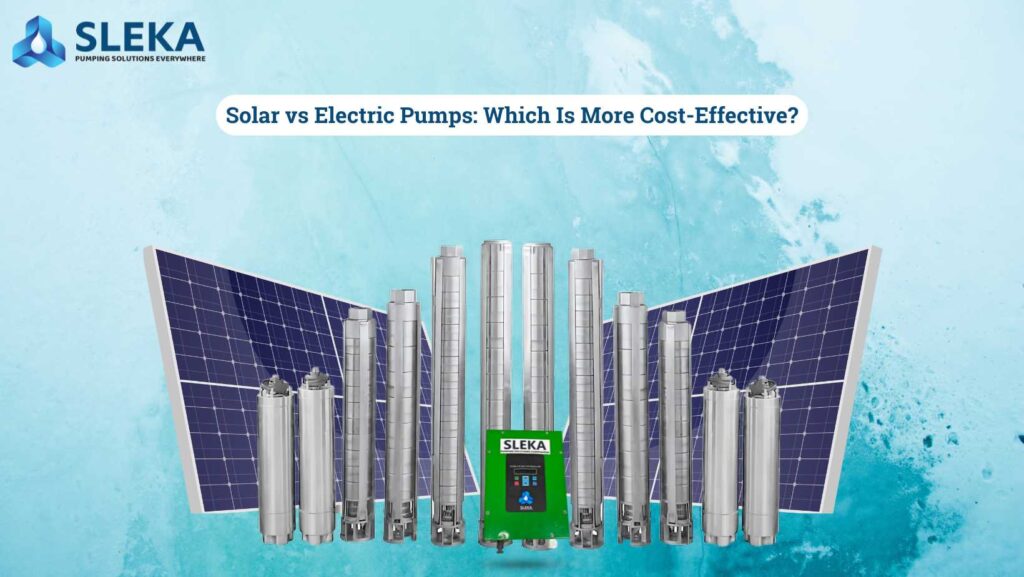7 Essential Factors to Consider When Choosing Between Solar vs Electric Pumps
When it comes to water pumping solutions, two primary options stand out: solar and electric pumps. Both systems have their unique advantages and drawbacks, making the choice between solar vs electric pumps critical for various applications, from agriculture to residential water supply. In this blog, we will explore the key factors to consider when deciding between these two types of pumps, providing insights that can help you make an informed decision. Additionally, we’ll highlight Sleka’s specialization in submersible pumps, which can be a great option for your pumping needs.
Understanding the Basics of Solar vs Electric Pumps
Before diving into the specifics of each type, it’s essential to understand the fundamental differences between solar and electric pumps. Solar pumps harness energy from the sun through photovoltaic cells, converting sunlight into electricity to power the pump. On the other hand, electric pumps rely on a connection to an electrical grid or generator to function.
Pros and Cons of Solar Pumps
Advantages:
- Sustainability: Solar pumps use renewable energy, making them environmentally friendly.
- Low Operating Costs: Once installed, solar pumps have minimal ongoing costs, as sunlight is free.
- Independence: They can be installed in remote areas without access to electricity.
Disadvantages:
- High Initial Cost: The upfront cost of purchasing and installing solar panels can be significant.
- Dependence on Weather: Performance can decrease on cloudy or rainy days.
- Space Requirements: Solar panels require adequate space for installation.
Pros and Cons of Electric Pumps
Advantages:
- Consistent Power Supply: Electric pumps provide a reliable and continuous water supply.
- Lower Initial Investment: Generally, electric pumps are less expensive to purchase and install.
- Higher Efficiency: They often have better performance in terms of flow rate and pressure.
Disadvantages:
- Operating Costs: Monthly electricity bills can add up, especially in high-demand scenarios.
- Dependence on Infrastructure: Requires access to a reliable electrical grid or generator.
- Environmental Impact: Reliance on fossil fuels for electricity can have a negative environmental effect.
Key Factors to Consider When Choosing Between Solar vs Electric Pumps
1. Application Needs
The first factor to consider is what you need the pump for. If you require a consistent water supply for agricultural irrigation or residential use, electric pumps might be more suitable due to their reliability. Conversely, if you’re looking for a solution in remote areas or for applications like garden fountains or livestock watering, solar pumps may be the better choice.
2. Budget
Your budget will significantly influence your decision between solar vs electric pumps. While solar pumps offer long-term savings on operating costs, the initial investment can be steep. Electric pumps typically have lower upfront costs but can incur ongoing electricity bills.
3. Location and Accessibility
Consider where the pump will be located. If it’s in an area with ample sunlight and minimal cloud cover, a solar pump could be highly efficient. However, if the site has easy access to electricity, an electric pump may be more practical.
4. Environmental Impact
For those concerned about their carbon footprint, solar pumps provide a sustainable alternative to traditional electric pumps. By using renewable energy sources, you can significantly reduce your environmental impact.
5. Maintenance Requirements
Both systems require maintenance, but they differ in what that entails. Solar pumps often require maintenance of the solar panels and battery systems, while electric pumps may need electrical system checks and repairs. Assess your ability and willingness to maintain the system you choose.
6. Energy Efficiency
When comparing solar vs electric pumps in terms of efficiency, electric pumps usually outperform solar options in terms of consistent flow rates and pressure during peak usage times. However, advancements in solar technology are continually improving their efficiency.
7. Sleka’s Submersible Pumps
When considering your options for water pumping solutions, don’t overlook Sleka’s specialization in submersible pumps. Sleka offers a range of high-quality submersible pumps that are suitable for various applications, including agricultural irrigation and residential water supply. Their expertise ensures that you receive a reliable product designed to meet your specific pumping needs.
Frequently Asked Questions (FAQ)
FAQ #1: What is the main difference between solar and electric pumps?
The primary difference lies in their power source: solar pumps use sunlight to generate electricity through photovoltaic cells, while electric pumps require a connection to an electrical grid or generator.
FAQ #2: Are solar pumps more expensive than electric pumps?
Solar pumps typically have higher initial costs due to the expense of solar panels and installation but offer lower operating costs over time compared to electric pumps.
FAQ #3: Can solar pumps work effectively in cloudy conditions?
While solar pumps can operate on cloudy days, their efficiency may decrease significantly compared to sunny days. Therefore, they are best suited for locations with ample sunlight.
FAQ #4: How do I choose between solar vs electric pumps?
Consider your application needs, budget, location, environmental impact, maintenance requirements, and energy efficiency when making your decision.
FAQ #5: Where can I find quality submersible pumps?
For high-quality submersible pumps tailored to various applications, visit Sleka’s product offerings at Sleka.
Wrapping Up
Deciding between solar vs electric pumps is crucial for ensuring you select the right solution for your water needs. While both options have their advantages and disadvantages, evaluating your specific requirements will help guide your choice. For those seeking reliable submersible pump solutions, Sleka stands out as a leader in the industry.
To know more about solar pumps in agriculture, visit Sleka Products.
To know more about Noryl impellers and diffusers, do visit Nobtech Products.


